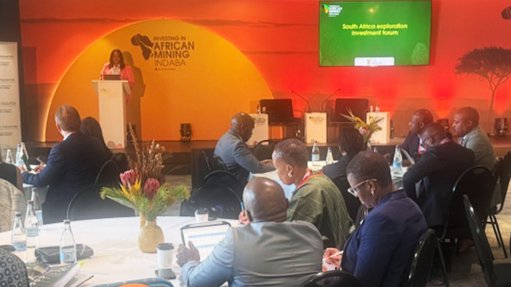Infrastructure key to agriculture's future
For agriculture to become a greater contributor to the economy and to better ensure food security, industry experts agree that the country needs investment into infrastructure and this, in turn, needs a targeted approach.
Speaking during a session at the inaugural Sustainable Infrastructure Development Symposium of South Africa on June 23, African Farmers Association of South Africa president Dr Vuyo Mahlati said agricultural infrastructure should be intentional, structured and strategic.
She explained that there were pockets of excellence where agricultural infrastructure was strategic, including the horticulture industry in the Western Cape that had efficient route-to-market systems.
“The province has demonstrated that if you get infrastructure and logistics right, you can move from primary production to agroprocessing and exporting globally.”
Mahlati also put forward that broadband should form part of the land, water and energy nexus that agriculture needs to be more productive, more competitive and sustainable in a global context.
She added that South Africa tended to not address the diversity of areas and their circumstances, which exacerbated issues such as land erosion in the Eastern Cape, and therefore unique issues needed to be taken into account for infrastructure investment in the sector.
Mahlati urged the country to no longer invest in hit-and-miss infrastructure development that "dies" without continuous funding from partners or government.
Agriculture, Land Reform and Rural Development Minister Thoko Didiza stated that infrastructure investment increasingly called for collaboration between private and public sector.
She mentioned that the sixth administration headed by President Cyril Ramaphosa had focused on mobilising resources to the success of the economy and development.
Didiza acknowledged that there was not a one-size-fits-all financing solution for producers and that blended models of finance had become increasingly important for agriculture development financing.
She said the State would continue working with financial institutions – locally and on the rest of the continent – to offer blended financing instruments for farmers and other agricultural developers.
Didiza further highlighted the importance of government being aligned both across provinces and with the private sector to work as an ecosystem for the benefit of the country, and facing the legacy issues in the sector as a unit.
She remarked that the sector might find it increasingly difficult to make its mark globally, given that countries were now trying to develop themselves and recover from the Covid-19 situation.
“We might find glitches with our old trading partners and there are some global issues that we will face no matter if we have a big or small agricultural sector.”
Land Bank commercial development banking executive Sydney Soundy said the country needed a proper, well-researched master plan that could dictate and direct where infrastructure development had to take place in the sector.
He added that the country did not invest in enough projects that were catalytic in nature and it should be a key requirement to be granted funding – having an impact across multiple industries or sectors.
Agricultural Research Council CEO Dr Shadrack Moephuli noted that infrastructure investment should also go into laboratories and not just onto land, since they certify conditions and standards of produce, as well as certify market access requirements for exports for farmers to be able to generate profits.
He added that some investment also needed to be targeted at technology development in the sector, which could increase productivity and better enable enterprises to be innovative.
Moephuli mentioned that infrastructure investment in agriculture would also need to increasingly consider climate change resilience factors – giving preference to projects that use renewable energy, for example, and those that use water efficiently.
Industry association Agri SA CEO Omri van Zyl stated that South Africa had the financial services capability to advance infrastructure investment in agriculture, as well as the human capital and the research institutions, the commodities and the projects that could be multiplied, but stressed that there was a need to be strategic in what the country invested in.
He also highlighted the need for a conducive environment for investment.
He pointed out his concerns around South Africa needing an agricultural credit board to offer loan funding for commercial farming and the need for traceability systems in the country. For example, a traceability system for livestock will enable the country to export meat to the European Union, as Namibia does, thanks to its livestock traceability system.
“The success rate for agricultural projects in South Africa is about 6%. We can have master plans, but the traction lies in the economics of agriculture. We need development instruments and institutions right for inclusive development,” Van Zyl said.
Further, Agricultural Business Chamber of South Africa economist Wandile Sihlobo noted that there needed to be an understanding why agricultural development had lagged in the past decade, especially in provinces such as Limpopo and the Eastern Cape.
He believes the success of public-private partnerships lies in a bottom-up approach whereby agricultural businesses identify the constraints in the sector, and the two sectors can then provide targeted funding and initiatives to solve these issues.
Sihlobo agreed with the other speakers that a master plan for the sector was necessary, because it would identify common opportunities and areas where partnerships could be established.
Article Enquiry
Email Article
Save Article
Feedback
To advertise email advertising@creamermedia.co.za or click here
Press Office
Announcements
What's On
Subscribe to improve your user experience...
Option 1 (equivalent of R125 a month):
Receive a weekly copy of Creamer Media's Engineering News & Mining Weekly magazine
(print copy for those in South Africa and e-magazine for those outside of South Africa)
Receive daily email newsletters
Access to full search results
Access archive of magazine back copies
Access to Projects in Progress
Access to ONE Research Report of your choice in PDF format
Option 2 (equivalent of R375 a month):
All benefits from Option 1
PLUS
Access to Creamer Media's Research Channel Africa for ALL Research Reports, in PDF format, on various industrial and mining sectors
including Electricity; Water; Energy Transition; Hydrogen; Roads, Rail and Ports; Coal; Gold; Platinum; Battery Metals; etc.
Already a subscriber?
Forgotten your password?
Receive weekly copy of Creamer Media's Engineering News & Mining Weekly magazine (print copy for those in South Africa and e-magazine for those outside of South Africa)
➕
Recieve daily email newsletters
➕
Access to full search results
➕
Access archive of magazine back copies
➕
Access to Projects in Progress
➕
Access to ONE Research Report of your choice in PDF format
RESEARCH CHANNEL AFRICA
R4500 (equivalent of R375 a month)
SUBSCRIBEAll benefits from Option 1
➕
Access to Creamer Media's Research Channel Africa for ALL Research Reports on various industrial and mining sectors, in PDF format, including on:
Electricity
➕
Water
➕
Energy Transition
➕
Hydrogen
➕
Roads, Rail and Ports
➕
Coal
➕
Gold
➕
Platinum
➕
Battery Metals
➕
etc.
Receive all benefits from Option 1 or Option 2 delivered to numerous people at your company
➕
Multiple User names and Passwords for simultaneous log-ins
➕
Intranet integration access to all in your organisation


















